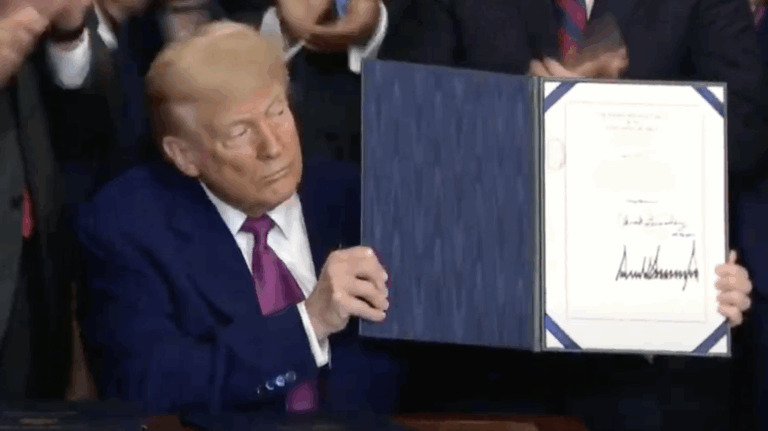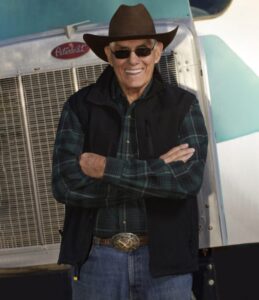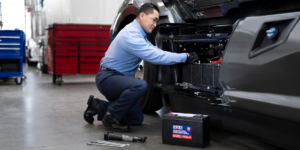WASHINGTON — President Donald Trump signed a resolution on Thursday that blocks California’s EV mandates.
California is expected to challenge the move in court. Approved by Congress last month the move aims to eliminate the country’s most aggressive attempt to phase out gas-powered cars. Trump also signed measures to overturn state policies curbing tailpipe emissions in certain vehicles and smog-forming nitrogen oxide pollution from trucks.
Owner-Independent Driver Association
“This is a big win for the men and women behind the wheel who keep America’s economy running,” said Todd Spencer, president, OOIDA. “With bipartisan support in Congress and President Trump’s signature, California has been stopped from forcing costly and unworkable rules on truckers nationwide. Our 150,000 small-business members have been saying it all along—electric trucks just aren’t a realistic option right now. They’re too expensive, the charging infrastructure isn’t there. California’s NOx rules are already driving up the cost of doing business. We’re grateful to the lawmakers who listened to real truckers and stood up for common sense.”
American Trucking Associations
The American Trucking Associations thanked Trump for revoking California’s “ruinous electric vehicle mandates and was honored to be part of the White House ceremony that marked a major step forward for setting realistic and achievable national emissions standards.”
“Today, common sense prevailed,” said Chris Spear, ATA President, CEO. “We thank President Trump, EPA Administrator Zeldin, and congressional leadership for taking decisive action to end crippling, detached-from-reality rulemakings that would have imposed devastating economic consequences on American businesses and families. This is not the United States of California. With the stroke of his pen, President Trump is restoring the certainty that the trucking industry needs to deliver for our nation as we continue to reduce our environmental impact.”
According to the ATA, the resolutions, passed by Congress under the Congressional Review Act and signed today by President Trump, roll back federal waivers granted to California under the Biden administration that allowed the state to set unrealistic and unachievable emissions and electrification mandates that could be adopted by the rest of the nation. They prevent California from setting de facto national emissions policies in the future and rightfully restore that power back to the EPA:
- A resolution championed by Rep. John James (R-Michigan) and Sen. Deb Fischer (R-Nebraska) revokes an EPA waiver that allowed California and other states to enforce its Advanced Clean Trucks (ACT) regulation. ACT, which has been adopted by 11 states, requires medium- and heavy-duty truck manufacturers to sell increasing percentages of zero-emission vehicles from 2024-2035.
- A resolution championed by Rep. Jay Obernolte (R-California) and Sen. Markwayne Mullin (R-Oklahoma) revokes an EPA waiver that allowed California and other states to enforce its Low NOx Omnibus rule. This rule, which has been adopted by ten states, imposes costly emissions standards on new truck sales.
In the Room Where it Happened
A total of nine trucking industry leaders with ATA joined the President in the East Room of the White House for the signing ceremony, including three professional truck drivers from America’s Road Team. Gina Jones, a professional driver for Werner Enterprises and an America’s Road Team captain, was invited to the podium by President Trump to deliver remarks.
“We cannot allow one state’s regulations to disrupt our entire nation’s supply chain,” Jones said. “Allowing California to do so would have negatively impacted the hundreds of thousands of truck drivers who deliver critical goods across the country each and every day.”
The trucking industry, for more than five years, has warned that California’s EV mandates were out of step with the operational realities of our industry and risked imposing massive costs on fleets, businesses, and consumers, according to the ATA.
Wishful Thinking
“Electric truck technology and charging infrastructure have not caught up with the wishful thinking of unelected Sacramento bureaucrats,” ATA said. “Compared with the 15 minutes it takes to fuel a diesel truck to go 1,200 miles, it takes six to eight hours to charge an electric truck that at best can travel 200 miles on a single charge. More trucks would be needed to move the same amount of freight, at a much slower rate, while in search of nonexistent charging locations. The added costs would have decimated the trucking industry and left consumers facing massive delays in shipments of vital goods, like groceries and health care products. We thank the Trump administration, EPA Administrator Lee Zeldin, and congressional leaders for hearing these concerns and charting a commonsense path forward toward emissions reductions while prioritizing the men and women of the trucking industry.”
Trucks today produce 99% fewer nitrogen oxide (NOx) and particulate matter emissions than those on the road decades ago, and new trucks cut carbon emissions by over 40 percent compared to trucks manufactured in 2010. As a result, 60 of today’s trucks emit what just one truck did in 1988, according to the ATA.
“We’ve done our part to reduce carbon emissions while keeping America’s economy moving,” Spear said. “But what we need is federal leadership to set realistic and achievable national emissions standards. And today brings us one step closer toward that goal.”
ATA will continue to work with federal policymakers to develop realistic, achievable, and cost-effective national emissions standards that allow the trucking industry to continue delivering for the American people.
American Fuel & Petrochemical Manufacturers (AFPM) and American Petroleum Institute
The American Fuel & Petrochemical Manufacturers (AFPM) President and CEO Chet Thompson and American Petroleum Institute (API) President and CEO Mike Sommers issued a joint statement via a press release on today’s event.
“The President and Congress just delivered a major win for the American people by overturning California’s gas car ban and the state’s attempt to tell consumers what they can and can’t drive,” the release said. “Today’s historic signing is critical for protecting U.S. families, manufacturing workers and our national energy security. We thank President Trump for keeping his promise to American voters to end these extreme and restrictive policies.”
Washington Trucking Associations
The Washington Trucking Associations (WTA) is also applauding the move.
Washington state previously adopted California’s Advanced Clean Trucks (ACT) regulations for medium- and heavy-duty trucks, requiring manufacturers to sell increasing percentages of zero-emission vehicles.
WTA has consistently challenged the state’s adoption of ACT which imposed unrealistic and unachievable emissions and electrification mandates on the industry.
“California’s EV trucking mandates have been a disaster for states like Washington, and have caused real harm to the trucking industry, a key link in our trade-dependent state’s supply chain network,” said Sheri Call, WTA president, CEO. “Washington state does not have the infrastructure in place to properly institute such a sweeping mandate like this, and the technology has not advanced enough yet to support the trucking industry’s rapid transition to clean energy. Our neighbors in Oregon recently opted out of these mandates for these same reasons.
“These mandates have imposed completely unworkable requirements on manufacturers, sellers and trucking operators, imposing huge costs for businesses and, eventually, consumers. This change will bring much needed relief to the industry and allow time to develop and fund a more realistic transition plan.”
Call noted that the industry is working with the Washington State Department of Ecology to help develop a better understanding of trucking’s unique challenges, share what the industry is doing today to reduce carbon emissions with available technology, and preview what’s on the horizon to further reduce carbon emissions while ZEV technology matures.
“We cannot overemphasize that additional time, investments and infrastructure is needed to make this work,” Call said. “We will continue to work with lawmakers and regulators on a workable path to electrification, one that meets the industry where we are and provides reasonable expectations for adoption. Today’s federal action infuses some much-needed common sense into what is a very challenging and unreasonable regulatory environment.”
California Air Resources Board
Not all are in favor of Trump signing the bill. The California Air Resources Board (CARB) adamantly opposes the move.
“Despite the President’s signature, this remains an unconstitutional, illegal and foolish attempt to undermine California’s clean air protections, said Liane Randolph, CARB chair. “We welcome Governor Newsom’s and California Attorney General Bonta’s prompt legal action and look forward to judicial review. In the meantime, CARB will use every tool at its disposal to continue our critical work to clean the air and address the climate crisis. The health and well-being of all Californians depends on it– especially those who live in underserved communities with unhealthy air. We look forward to engaging with the state legislature, stakeholders, and the public as we follow the Governor’s executive order to further advance the state’s clean vehicle transition.
“Beyond the environmental and public health consequences of these illegal actions, there is an economic cost, too. This is one of an ever-growing list of vindictive actions to cement reliance on harmful, antiquated technology that will only hurt the long-term competitiveness of the U.S. auto industry in a global market that is rapidly advancing toward cleaner combustion technology and zero-emission vehicles. California is committed to continuing our work to move toward a clean transportation system and a sustainable economy.”










